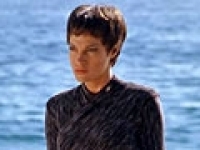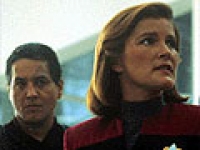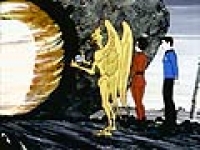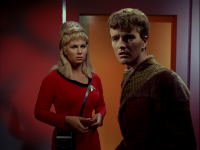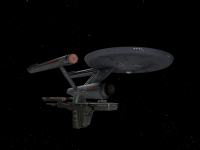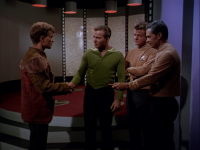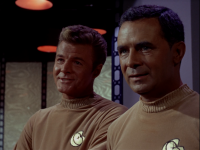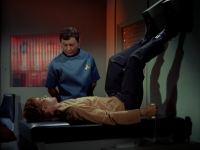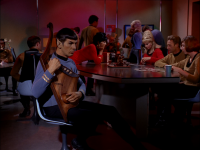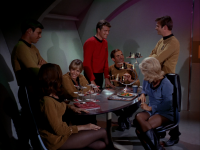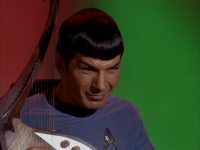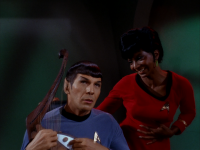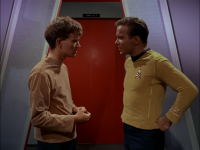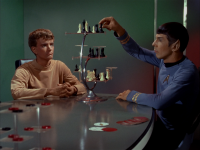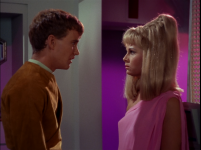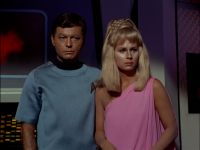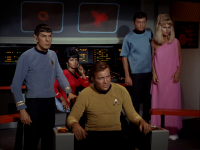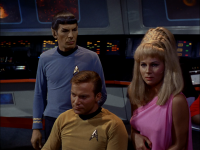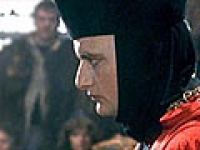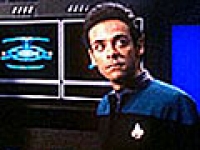Star Trek: Newest — 1x02 — Envoys
Synopsis
After a high profile mission goes awry, Boimler is further plagued with self-doubt when Mariner proves herself to be a more naturally talented sci-fi badass than he. Rutherford quits his job in engineering and explores other departments on the U.S.S. Cerritos.
Remarkable scenes
- Mariner: "All Klingon names sound the same, like they all have an apostrophe for some reason."
- Rutherford's ridiculous command training simulations.
- Rutherford's awful bedside manner in sickbay.
Review
Another mixed bag with some effective comedy and some less effective comedy. While overall enjoyable, this episode featured some unfortunately problematic content as well. First, the opening scene with the energy life form had a number of conceptual problems. For one, why didn't Mariner or Tendi report an apparently hostile alien encounter to security? Also it seems not terribly in the spirit of Star Trek for Mariner to attempt to exploit its life force to replicate tools. And lastly, what happened to it when it collided with the captain? Did it possess her? Did it die? It's entirely unclear, but since it's not followed up on by the end of the episode, we have to presume it's either dead or this is a long term plot thread that will be followed up on in a future episode. Either way, it was a pretty tasteless joke to start the episode off with.
Another wrinkle is Rutherford's implant continuing to be a source of annoyingly unexplained superpowers. It now apparently imbues him with exceptional fighting skills which further compounds the question of why does he have the implant, why aren't more people getting them if they're so awesome, and so forth. But the writers apparently have no interest in that question thus far. The most annoying detail though was the little one liner at the end of the speed walking scene when Boimler quipped that "Section 31 does this." On the surface it may seem like an innocent jokey canon reference, but we have to remember that this show takes place only about five years after the Dominion War. Prior to that, Section 31 was a secret, shadowy organization that nobody knew about. Presumably in the ensuing five years Bashir and O'Brien have blown the whistle, so people knowing about Section 31 now is not nearly as problematic as Discovery's portrayal of Section 31, but similar to Discovery's problematic portrayal of Section 31, Boimler felt it was entirely appropriate to name drop them as though they were some kind of admirable organization; this admiring reference being made a short time after they attempted to commit a genocide against the founders of the Dominion. Like the energy life form scene, this too is in poor taste.
Annoying wrinkles aside, there is much to love about the main plots of this story though, not the least of which is the first authentic portrayal of Klingons since Star Trek: Enterprise. General K'orin looks, sounds, and acts like the Klingons we know and love from previous Star Treks, avoiding the rebooted downgrades we saw in the Kelvin films and Discovery. Mariner's affinity for him and her overall consistent success with thinking on her feet and fitting in with diverse groups of people with ease was a delightful running gag especially contrasted to Boimler's inferiority complex and overeagerness. The staged Ferengi encounter to make Boimler feel better at the end was quite touching and nicely done, as were Rutherford's rotations through different crew assignments for the most part with the bedside manner scene perhaps being the highlight of the episode, though the command training simulations might be a close second. While it would be nice if they would cut back on the canon references a bit if they aren't willing to use them more carefully, this is another solid episode of what's shaping up to be a consistently charming show.
Star Trek: Newest — 1x02 — Maps and Legends
Synopsis
Picard begins investigating the mystery of Dahj as well as what her very existence means to the Federation. Without Starfleet's support, Picard is left leaning on others for help, including Dr. Agnes Jurati and an estranged former colleague, Raffi Musiker. Meanwhile, hidden enemies are also interested in where Picard's search for the truth about Dahj will lead.
Remarkable scenes
- The flashback to the attack on Mars.
- Admiral Clancy: "Sheer fucking hubris. You think you can just waltz back in here and be entrusted with taking men and women into space?"
- Clancy: "There's no peril here. Only the pitiable delusions of a once great man desperate to matter."
- Picard: "I never really cared for science fiction. I guess I just didn't get it."
- Soji and her team operating on former Borg drones.
- Picard: "The daughter of the man whose death I have been mourning for two decades comes to me for help and assistance. And then she is assassinated in front of my eyes by a Romulan death squad who will then will go and try and find and destroy her twin sister. And you want me to sit here worrying about what to do about the spittlebugs on the pinots?"
Review
It turns out that bigotry towards androids had been on the rise over the preceding decades. The Utopia Planitia workers didn't regard their android coworkers as people. Their attitudes probably weren't that uncommon across the Federation. It turns out that Starfleet did exactly what Picard was afraid of way back in TNG: The Measure of a Man. They created a race of android slave laborers, not unlike the hologram slave labor race they created with the Emergency Medical Holograms in Voy: Author, Author. This progression of events is very similar to the backstory of Battlestar Galactica (2003). A quote from Commander Adama in BSG's pilot is on point here: "We decided to play god. Create life. When that life turned against us, we comforted ourselves in the knowledge that it really wasn't our fault, not really." That is the sentiment that Federation society is expressing right now. However, Adama went on to say: "You cannot play god then wash your hands of the things that you've created. Sooner or later the day comes when you can't hide from the things that you've done anymore." That is the sentiment that the narrative appears to be expressing. The Federation refuses to take responsibility for all the awful things it has done to its artificial life forms. We still don't know precisely why the synths attacked, but treating them as a slave race just as Picard warned against decades ago probably didn't help matters.
Another nice piece of exposition we got in this episode was when Admiral Clancy explained that the Federation's decision to let the Romulans fend for themselves was due to political pressure from fourteen different Federation members threatening to secede from the Federation if the rescue mission was allowed to continue. This significantly clarifies why the Federation would consider abandoning a humanitarian mission and makes it easy to see both sides of the argument. On one hand, Picard is right that it is unconscionable to let people die needlessly. He was indeed right that we shouldn't refer to them pejoratively as Romulans, but instead simply as people. On the other hand, it's hard to argue with Admiral Clancy's logic that allowing fourteen members of the Federation to secede might destabilize the Alpha Quadrant to such a degree that abandoning the rescue mission could quite reasonably have been the lesser of two evils. What if a partial dissolution of the Federation led to a war that killed even more people? If members of the European Union threatened to secede if the EU offered medical relief to a geopolitical rival during a natural disaster, would the EU accede to this demand or let them secede? It's hard to know. It would probably depend on which members were making the demand, how vital they were to the union, and what the geopolitical repercussions of secession would be.
Meanwhile we learn much more about why the Romulans appear to be taking up residence inside the wreckage of a Borg cube. It seems they captured the cube after it was severed from the collective for some unknown reason, then used it to extract Borg technology and profit by exploiting it. They've had the cube for a very long time (more than a decade!), refer to it as "The Artifact," and consider it a research institute where they invite foreign scientists to work for them, though apparently only after a great deal of vetting. Former Borg drones are aboard, slowly being "reclaimed." The narrative seems to be strongly implying there's a lot more going on here than simply a salvage operation and a science project though, so we'll have to wait and see what else all this is all about. The whole thing is quite thrilling and fascinating though!
As for Picard himself, he doesn't want to reassemble the old TNG crew because he doesn't want any of them to end up like Data. He has developed the neurological disorder that was foreshadowed in TNG: All Good Things ("Irumodic Syndrome"). It is incurable and he will soon die. We see the full extent of his falling out with Starfleet in this episode when Admiral Clancy dresses him down in a powerful way. Her "sheer fucking hubris" line followed shortly by referring to Picard's request as "the pitiable delusions of a once great man desperate to matter" certainly make that scene one of the most memorable exchanges in all of Star Trek so far, mostly because it's justly deserved. He's burned far too many bridges to be able to just be handed a starship and a crew and fly off into the sunset again. Back in the day he could crash the Enterprise-D into a planet and Utopia Planitia would get busy building a brand new state of the art flagship just for him, but nowadays he can't even get the admiralty to commission him a garbage scow. It's very effective drama. That said, it does beg the question of just what Admiral Janeway is up to nowadays. It's hard to imagine her refusing to take Picard seriously given her affinity for Voyager's doctor, a form of artificial life that was oppressed just as the androids were. It's quite unfortunate that the story hasn't addressed this question yet.
Another unfortunate detail was nearly all the exposition concerning the Zhat Vash. While none of it is necessarily irreconcilable with canon, the amount of hyperbole used to describe them evokes the worst aspects of the overwrought storytelling style of Discovery or TOS. The Zhat Vash are referred to as keeping a secret "so profound and terrible that just learning it can break a person's mind..." Uh, okay. Whatever. Also speaking of Discovery aesthetics, holo communicators are apparently back in fashion after falling out of fashion during TOS and TNG, then briefly coming back into fashion during DS9, then falling out of fashion again... until now. Whatever. That's not necessarily irreconcilable with canon either, but it is an indicator that this show is more willing to embrace Discovery's visual language than perhaps it should be. More concerning was that little holographic original series Enterprise floating in the Starfleet HQ lobby which used Discovery's TOS reboot aesthetics. While a minor detail, this is a serious cause for concern because it implies that Star Trek: Picard endorses the "visual reboot" that Discovery proffered, which we should firmly reject. Instead, we should continue to hope that Discovery can be safely confined to a multiverse set apart from the main canon, like the Kelvin films for the sake of preserving visual canon. Hopefully this is the last time this topic needs to be discussed on Star Trek: Picard!
Overall though this is another strong episode. Not as strong as the pilot, but clearly there is a lot of potential in this story!
Star Trek: Newest — 1x02 — Battle at the Binary Stars
Synopsis
Face to face with Klingon vessels, the U.S.S. Shenzhou prepares for the possibility of war if negotiations fail. Amidst the turmoil, Burnham looks back to her Vulcan upbringing for guidance.
Remarkable scenes
- Burnham's flashback to her awkward first meeting with Georgiou.
- Georgiou relieving Burnham of duty for insubordination.
- T'Kuvma summoning the entire high council to the beacon.
- The Klingons attacking.
- Connor: "Why are we fighting? We're Starfleet. We're explorers, not soldiers."
- Connor being suddenly blown out into space by battle damage.
- Sarek rescuing Burnham with a mind meld in a flashback. One wonders if Picard acquired Sarek's memories of Burnham from TNG: Sarek?
- Burnham observing the space battle through the brig forcefield into open space.
- The Shenzhou being rescued by the Europa.
- The Europa being bisected by a kamikaze strike from a Klingon vessel.
- The Europa self-destructing to take out the Klingon ship that rammed it.
- T'Kuvma leaving survivors only to serve as witnesses to his victory to spread fear throughout the Federation.
- Burnham talking the computer into letting her jump through a vacuum. While Kirk talks computers to death, Burnham talks computers into saving lives!
- Georgiou bombing T'Kuvma's ship using a dead Klingon body being retrieved.
- Georgiou and Burnham attempting to capture T'Kuvma only to see Georgiou killed by T'Kuvma and T'Kuvma killed by Burnham.
- Burnham being court martialed, convicted, stripped of rank, and sentenced to prison.
Review
Star Trek: DiscoveryShenzhou kicks into high gear in this thrilling followup to the pilot's cliffhanger at the end of the first episode. It's nice to see lasting, painful consequences result from Burnham opening pandora's box with the Klingons. Georgiou is tragically killed, T'Kuvma is martyred, and Burnham is in prison for starting a war! Having the main character's life permanently upended in this way sets the stage for a kind of drama never before seen on Star Trek, a welcome change of pace.
This skillfully-written episode makes good use of foreshadowing and parallelism. Burnham's character is shaped by a traumatic attack by the Klingons which killed her parents, leaving her a ward of Sarek. While not depicted in as much detail, it turns out a parallel story played out for T'Kuvma as well, as he apparently lost his parents at a young age too and likewise engaged in a process of self-discovery after "discovering" his father's ship and vowing to restore honor to his house.
Their similar childhoods ironically make them particularly hostile to each other: Burnham fears the Klingons as much as T'Kuvma fears the Federation. Burnham is afraid that the Klingons could take something or someone else dear to her and T'Kuvma sees the Federation as an existential threat to Klingon identity.
Indeed, both of them suffer exactly that which they fear most. T'Kuvma succeeds in provoking a war with the Federation, but in addition to costing him his life, we know from other Star Trek productions that the war doesn't end well for the Klingons. Likewise Burnham watches Georgiou die at T'Kuvma's hands. Then in her moment of grief with her self-esteem at perhaps an all time low, she declares, "We are at war and I am the enemy," shortly before being stripped of rank and sentenced to prison. All this was nicely foreshadowed in the previous episode when Georgiou said to Burnham, "I trust you with my life, but it doesn't change the fact that you're lost." Georgiou's trust was misplaced and Burnham is even more lost now than she may have been before.
Another interesting piece of perhaps unintentional foreshadowing from the previous episode is when Georgiou asked Burnham in the desert how long the storm would take to come crashing down on them. She estimated one hour, 17 minutes, and 22 seconds, or roughly 77 minutes. If you think of the coming of a storm as a metaphor for the battle with the Klingons, the grimmest part of the battle for our heroes is roughly 77 minutes into the screen time of the Star Trek: DiscoveryShenzhou series so far.
While this episode is terrific overall, there are some flaws to take note of. Aside from the copious continuity problems introduced here and noted above, Sarek's mind meld across a thousand light years of space due to some kind of subspace katra bond strains suspension of disbelief pretty hard. And what was with that ridiculously dark room the court martial was conducted in? Shadowy figures convicting our hero isn't dramatic, it's dumb. Do judges in the real world turn off all the lights for dramatic effect when sentencing criminals? No. So turn on some frigging lights!
Those are small nitpicks for the most part though and by and large this was a fantastic piece of drama. Putting Burnham in such a dark place (the figurative part anyway...) is an incredibly compelling way to set up a gripping story about how she grapples with both her personal losses and her responsibility to Federation society for having started the war with the Klingons. It seems clear that Star Trek: DiscoveryShenzhou is not at all interested in repeating Star Trek: Enterprise's mistake of failing to depict the single most important event in the historical canon of the era that it is depicting. Enterprise failed to depict the Earth-Romulan war even with four seasons. But this series started the war with the Klingons in episode two. And that's awesome.
Star Trek: Newest — 1x02 — Broken Bow, Part II
Synopsis
The Enterprise crew sets on a maiden voyage with a mission to return a wounded Klingon to his people.
Remarkable scenes
- Archer: "Even if it is Klang, we're going to have a tough time getting him out of there." Reed: "We could always try the transporting device." Archer: "We've risked too much to bring him back inside out."
- Enterprise stealing a Suliban ship.
- Reed: "They're called phase pistols. They have two settings. Stun and kill. It would be best not to confuse them."
- Trip scraping the hull of the Suliban superstructure, just like he scraped Enterprise in part one. ;)
- Archer and Trip disabling the Suliban superstructure.
- The fight inside the freaky room.
- Archer's reaction to being beamed up.
Review
I'm really starting to like Silik. He reminds me of Scorpius from Farscape. He even calls the captain by his first name, Jon, the same way Scorpius does to Crichton. :) I wonder if the parallel is intentional. Part two wasn't as exciting as part one, mostly because what happened was largely predictable and some of it redundant. I did like more of the smaller details in part two though. We already got a little bit of the crew's aversion to the transporter when Reed and Travis discussed it in the previous episode. But I rather liked Archer's rather blatant statement of distrust of the transporter in this episode, claiming that it would bring back the user "inside out." A nice irony that Trip would be later forced to use the transporter to rescue Archer. I loved the look on Archer's face after having been transported. The symbolic meaning in Archer's dreams is finally clarified. In part one they didn't seem to serve much of a purpose. Now Archer is recalling his father's advice and applying it to try and quell his natural distrust of Vulcans and to command with no fear. I loved the scene when Henry Archer said "don't be afraid of the wind," showing a picture of T'Pol. The only thing I didn't like about this episode, besides the technical problem listed in the problems section and the things I complained about in part one was the highly inappropriate decontamination chamber scene. What can I say? That was just totally unnecessary. Overall though, I thought the pilot episode was quite good, much better than I thought it would be.
Star Trek: Newest — 1x02 — Caretaker, Part II
Synopsis
The crew races to save Torres and Kim.
Remarkable scenes
- Neelix' introduction.
- Neelix' reaction to the transporter.
- Tuvok suggesting to Neelix that he take a bath.
- Neelix indulging himself in his quarters.
- Neelix annoying Tuvok.
- Neelix' successful manipulation of the events to save Kes.
- Janeway pulling the plug on the doctor.
- Tuvok discovering that the caretaker is dying.
- Paris saving Chakotay.
- The huge Kazon ship.
- Chakotay: "Tell one of your crackerjack Starfleet transporter chiefs to keep a lock on me!"
- Chakotay crashing his ship into the huge Kazon vessel.
- The Kazon ship crashing into the array.
- The Caretaker's final words.
- Janeway destroying the array.
Review
Following in the tradition of the first part, Neelix and Kes are introduced very nicely in this episode. I like how Chakotay and Tom have settled their differences in this episode. When Tom saves Chakotay's life and asks about the Native American tradition which would dictate Chakotay's life belonging to Tom, Chakotay says "wrong tribe." But at the end of the episode, Janeway tells Tom that Chokotay mentioned something to her about his life belonging to Tom and that he'd be responsible for Tom's safety. He lied! Very funny. The Caretaker's complete motives are finally revealed in this episode, which brings up the moral dilemma regarding whether to use the array to get home or to destroy it to protect the Ocampa. Many fans call Janeway stupid for deciding to stay in the Delta Quadrant to protect the Ocampa, even Tuvok questions the decision in this episode, as does Torres. Janeway herself will question it a few times later in the series. Personally, I wish they had handled the decision in this episode a little differently. Think about it. The Kazon are all over that array like flies on garbage and Tuvok said it would take hours to configure it to send them back. Do you really think the Kazon are going to just sit there while Janeway and Tuvok are tinkering with the array for two hours? No, I don't think so. And for this reason, I say Janeway was forced into her decision, despite the fact that it seems she would have anyway. A fantastic pilot, probably the best pilot episode of any of the series.
Star Trek: Newest — 1x02 — Yesteryear
Synopsis
By using the Guardian of Forever, Kirk, Spock, and the historian Erikson explore the planet Orion's past. When they return, there is no record of Spock.
Remarkable scenes
- Nobody knowing who Spock is.
- The first officer, an Andorian! Cool.
- Spock learning of his own death.
- An Andorian using the Vulcan salute. Surreal...
- Seeing the planet Vulcan is always remarkable.
- Sarek's appearance.
- Seeing Spock's sehlat. They look so cute and harmless in a cartoon unlike Spock's description in TOS: Journey to Babel.
- Spock talking to Spock.
- McCoy bemoaning about having to recalibrate his Tricorder to give Spock a physical.
Review
TAS is not considered canon by most people, which I disagree with. However, even among people who firmly believe TAS is not canon, this episode is largely an exception. Mostly because Spock's backstory is established here. The details of which will be confirmed by later live action shows. I take one point off for using the ridiculous Guardian of Forever and the ensuing time travel absurdity. Other than that a wonderful episode. Remarkable alien: the winged bird-like alien, a Federation member.
Star Trek: Newest — 1x02 — Charlie X
Synopsis
A powerful teenage boy wreaks havoc aboard the U.S.S. Enterprise.
Filler rating: good filler
There's no essential plot or exposition in this episode that renders it unskippable, but it's a decent episode, even though it could have been better.
Remarkable scenes
- Charlie: "Is that a girl?" Kirk: "That's a girl."
- Charlie slapping Rand on the ass.
- Kirk and McCoy arguing over who will mentor the boy.
- Uhura singing to Spock's harp playing.
- Kirk trying to explain why you don't slap women on the ass to Charlie and utterly failing at it.
- Rand trying to hand Charlie off to Yeoman Tina.
- The athletic scene with Charlie and Kirk.
- Charlie making Spock say odd things.
- Kirk taking on Charlie, gambling his powers were being overtaxed.
- Charlie begging to stay on board when the non-corporeal green aliens came to take him away.
Review
A boy growing up in isolation only to be reintegrated with civilization during his adolescence is a fantastic premise for a story, but this wonderful premise is largely ruined by the annoying supernatural influences injected into the plot in order to make Charlie more menacing. Not every episode of Star Trek needs to have aliens, and this episode certainly could have benefited from a simpler story.
That said, despite the handicaps, Charlie X is still a decent story. We certainly do get to see shades of what such a reintegration of a lost child would be like during the scenes when Charlie isn't using his superpowers. The scoring of the episode is also particularly good, especially in the earlier scenes.
The best moments are when Kirk is forced to play a sort of father figure for Charlie against his will. In spite of his stumbling through it, Kirk's pretty good at it! Overall though the episode is high on potential and low on payoff. A better story would have simply shown us what Charlie's reintegration with his closest family on the colony would have been like. Superpowers simply for the sake of seeing superpowers just isn't a compelling drama.
Star Trek: Newest — 1x02 — Encounter At Farpoint, Part II
Synopsis
Picard continues on with his mission to Farpoint hoping to prove to Q that humans are not a grievously savage race.
Filler rating: not filler
Introduces numerous characters and plot threads that continue throughout Star Trek going forward.
Remarkable scenes
- Picard to Worf: "Do you intend to blast a hole through the viewscreen?"
- Wesley's awkward interactions with Picard.
- Picard's private meeting with Beverly clumsily attempting to welcome her aboard properly.
- Picard solving the Farpoint mystery to Q's begrudged satisfaction.
Review
An intriguing difference from TOS seen clearly in the second part of Encounter at Farpoint is the clear establishment of long term plot arcs. The past relationship between Riker and Troi, Geordi's blindness, and Picard's history with Beverly and Wesley are all plot elements that clearly have more backstory and more developments left to unfold. In this regard, Encounter at Farpoint functions better as setup for future stories than it does as a story in its own right. Q's mystery of the space jellyfish was indeed, as Q noted, too easily solved. And the question of Q's precise motives for toying with the Enterprise crew leaves yet another mystery for a future episode to solve. While it is certainly nice to see the writers show a willingness to develop characters and plots over time which was exceedingly rare on TOS, a better story would've been more notable for its own developments rather than mostly for what it sets up for later.
The biggest flaw with Encounter at Farpoint is the pacing. So many scenes feel padded out unnecessarily to fill time. But there were other notable flaws too. One particularly cringeworthy feature of the episode is the romantic tension between Riker and Troi. They are heavily implied to have had some kind of romantic relationship in the past prior to their assignment to the Enterprise. After what was evidently a relatively amicable breakup, they are now flung back into each other's company unexpectedly by both being serendipitously assigned to the Enterprise. There's nothing wrong with that premise, but how it plays out in the episode leaves much to be desired, with the climax of absurdity being Troi not-so-subtly trying to nudge Riker into going into the underground caverns alone with her and then dropping even the pretense of subtlety when she has her "Don't! If you should be hurt!" outburst.
Troi and Riker both exhibited some unsavory characteristics of their own independent of each other too. It could perhaps go without saying that how Troi's empath powers were portrayed was quite lame. Watching her repeatedly exclaim, "Pain! Anger! Powerful mind!" is an exceptionally lazy way to do exposition, as it violates the principle of "show, don't tell." Heightening the irritation of watching these scenes is the silly degree of overacting that Marina Sirtis brings to the table for them. But we should place the majority of the blame on the writing here, not the acting. Her worst line was clearly an example of bad writing, not bad acting: "I'm only half Betazoid. My father was a Starfleet officer." She says this as if it goes without saying that her father could not be Betazoid if he was in Starfleet; as though those things are mutually exclusive. This strangely contradicts the idea that anyone can be in Starfleet, even a Klingon.
For Riker's part, his scene with Data on the holodeck was especially awkward as well, mostly for Riker's remarks, but partly for Data's as well. Mostly the problem with the scene is Riker's weirdly anachronistic prejudice directed at Data. While it was nice to see Data call him on it, it's surprising to see the show assassinate one of its main characters by depicting him as bigoted out of the gate. But then it gets even weirder when Riker responds to Data's remark about prejudice by interpreting it to mean that Data thinks he's superior, after which Data bizarrely agrees, in fact, he does consider himself superior. Yeesh. The whole point of depicting a multiracial, multispecies society like the Federation that was forged out of the crucible of the eugenics war and the "post-atomic horror" of a third world war is that by the 24th century, people should be beyond these kinds of shallow bigotries. But apparently Riker still has some lizard brain left to beat back. No wonder Q found just cause to test to see if the Federation was still "grievously savage" or if it had evolved beyond its animal instincts.
In any event, despite some awkward moments, Encounter at Farpoint is still a pretty strong story and a good start to a show that does indeed promise to be, as Picard put it, "much more interesting" down the road. Engage!
Star Trek: Newest — 1x02 — Emissary, Part II
Synopsis
On a distant outpost at the edge of the final frontier, an untested crew embarks on an unprecedented journey.
Filler rating: not filler
Not filler by virtue of being the pilot.
Remarkable scenes
- Odo crashing the Cardassian ship's computers.
- O'Brien getting the Cardassian computer to work by kicking it.
- Sisko and Dax' first trip through the wormhole.
- Sisko's first meeting with the prophets.
- Moving DS9.
- O'Brien getting in a fight with the computer.
- O'Brien: "Computer, you and I need to have a little talk."
- Odo: "Doctor, in my experience, most people wouldn't know reason if it walked up and shook their hand."
- O'Brien mentioning his participation in the border wars to Bashir.
- Morn appearances; while Odo is evacuating everyone to safer parts of the station.
- The special effects used in the battle with the Cardassians were quite good.
- The Rio Grande towing Dukat's ship back through the wormhole.
- Sisko treating Picard better in his second conversation with him.
- Kira to Quark: "If you don't take that hand off my hip, you'll never be able to raise a glass with it again."
- Morn appearances; 1. In background when Sisko is reunited with Jake; 2. In the background in the last shot.
Review
This episode is a fine sequel to the first part, but it suffers from the scenes with the prophets being far too lengthy. That, and all the great fun trivia and whatnot was all introduced in the first part. So the second part is merely a conclusion to the plot of the first. In the end, we're left with a nice premise for the show. In particular, the wide cast of characters is exceptional. I'm most fond of Commander Sisko. He's not as cowboyish as Kirk was, but he's not as rigid and stuck up as Picard is. Kind of the best of both worlds. Other notable highlights are Odo and Quark. The interplay between them is fun. Even in the first episode, DS9 is competently able to make use of a vast set of characters and complex plots, setting the stage for a stellar new Star Trek show.



